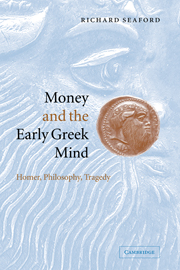Book contents
- Frontmatter
- Contents
- Preface
- List of abbreviations
- 1 Introduction
- PART ONE THE GENESIS OF COINED MONEY
- 2 Homeric Transactions
- 3 Sacrifice and distribution
- 4 Greece and the ancient Near East
- 5 Greek money
- 6 The preconditions of coinage
- 7 The earliest coinage
- 8 The features of money
- PART TWO THE MAKING OF METAPHYSICS
- References
- Index
6 - The preconditions of coinage
Published online by Cambridge University Press: 22 September 2009
- Frontmatter
- Contents
- Preface
- List of abbreviations
- 1 Introduction
- PART ONE THE GENESIS OF COINED MONEY
- 2 Homeric Transactions
- 3 Sacrifice and distribution
- 4 Greece and the ancient Near East
- 5 Greek money
- 6 The preconditions of coinage
- 7 The earliest coinage
- 8 The features of money
- PART TWO THE MAKING OF METAPHYSICS
- References
- Index
Summary
SACRIFICIAL SPITS
The Greeks themselves were aware that their coin of low value the obol (obolos) took its name from the spit (obelos), and that ‘drachma’ meant originally a handful of (six) spits. Six obol coins do not make a handful. As we shall see, it is almost certain that ‘drachma’ can refer to spits in sixth-century inscriptions: and ‘handfuls of spits’ (obeliskōn drachmai) are recorded in an early fourth century bc temple inventory. In early inscriptions the coin is refered to obelos, to be generally replaced later by obolos.
This apparent transition from roasting spits to coins was, along with other terms that seem to embody the transition from the sacrificial to the financial (4d), adduced by Laum as part of an argument to the effect that animal sacrifice was an important factor in the genesis of coinage. The public sanctuary becomes, with the development of substitutes (such as figurines) for animal victims, a centre of exchange. And the communal distribution of sacrificial meat – to warrior, priest, prize-winner, etc. – is, he argues, the earliest form of polis finance. Of Laum's complex argument I can here give only this brief summary. Although he did in various details go too far, his basic insight has on the whole suffered neglect rather than refutation. In the course of my overall argument I modify and develop it in line with my overall concern with the distinctiveness of Greek culture.
- Type
- Chapter
- Information
- Money and the Early Greek MindHomer, Philosophy, Tragedy, pp. 102 - 124Publisher: Cambridge University PressPrint publication year: 2004



